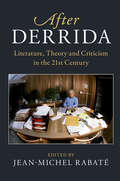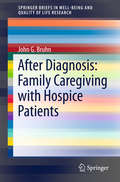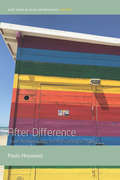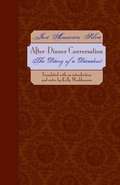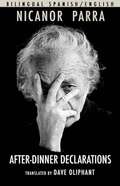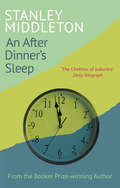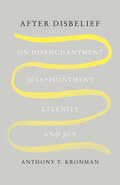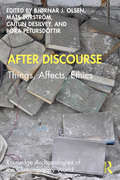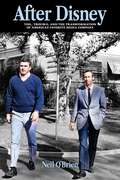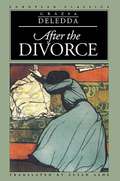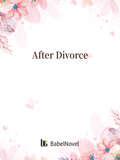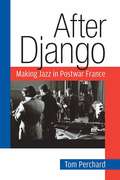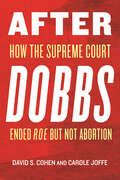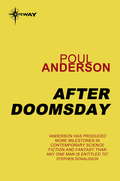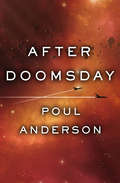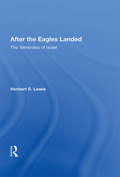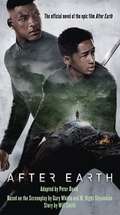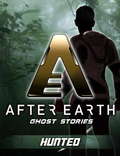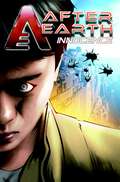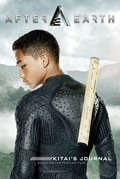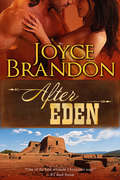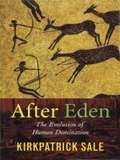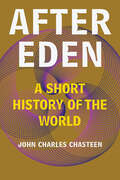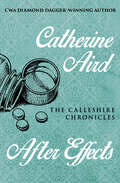- Table View
- List View
After Derrida: Literature, Theory and Criticism in the 21st Century ( After Series)
by Jean-Michel RabatéThis collection of essays explores the main concepts and methods of reading launched by French philosopher Jacques Derrida who died in 2004. Derrida exerted a huge influence on literary critics in the 1980s, but later there was a backlash against his theories. <P><P>Today, one witnesses a general return to his way of reading literature, the rationale of which is detailed and explained in the essays. The authors, both well-known and younger specialists, give many precise examples of how Derrida, who always remained at the cusp between literature and philosophy, posed fundamental questions and thus changed the field of literary criticism, especially with regard to poetry. The contributors also highlight the way Derrida made spectacular interventions in feminism, psychoanalytic studies, animal studies, digital humanities and post-colonial studies.<P> Proposes a new and simple view of deconstruction.<P> Provides many concrete examples of applications of theories to literary readings.<P> The authors look to the future of literary studies.
After Diagnosis: Family Caregiving with Hospice Patients (SpringerBriefs in Well-Being and Quality of Life Research)
by John G. BruhnThis brief provides approaches to help family caregivers understand the role of caregiving, its challenges and consequences. Using real life case examples, it illustrates the essentials of family caregiving. The caregiving role can be a source of caregiver stress and can become increasingly burdensome. People are now living longer and acquiring chronic diseases, which makes it necessary to involve caregivers to assist in disability care for longer periods of time, and live out their end-time at home, which means caregivers are more and more needed, especially at the end-of-life. This brief illustrates the role and scope of caregiving and its future growth. It is useful to physicians, social workers, sociologists, psychologists, nurses, public health, public policy and families and has a broad appeal for use in courses on Death and Dying.
After Difference: Queer Activism in Italy and Anthropological Theory (WYSE Series in Social Anthropology #6)
by Paolo HeywoodQueer activism and anthropology are both fundamentally concerned with the concept of difference. Yet they are so in fundamentally different ways. The Italian queer activists in this book value difference as something that must be produced, in opposition to the identity politics they find around them. Conversely, anthropologists find difference in the world around them, and seek to produce an identity between anthropological theory and the ethnographic material it elucidates. This book describes problems faced by an activist "politics of difference," and issues concerning the identity of anthropological reflection itself—connecting two conceptions of difference whilst simultaneously holding them apart.
After-Dinner Conversation: The Diary of a Decadent
by José Asunción SilvaLost in a shipwreck in 1895, rewritten before the author's suicide in 1896, and not published until 1925, José Asunción Silva's After-Dinner Conversation (De sobremesa) is one of Latin America's finest fin de siècle novels and the first one to be translated into English. Perhaps the single best work for understanding turn-of-the-twentieth-century writing in South America, After-Dinner Conversation is also cited as the continent's first psychological novel and an outstanding example of modernista fiction and the Decadent sensibility. Semi-autobiographical and more important for style than plot, After-Dinner Conversation is the diary of a Decadent sensation-collector in exile in Paris who undertakes a quest to find his beloved Helen, a vision whom his fevered imagination sees as his salvation. Along the way, he struggles with irreconcilable urges and temptations that pull him in every direction while he endures an environment indifferent or hostile to spiritual and intellectual pursuits, as did the modernista writers themselves. Kelly Washbourne's excellent translation preserves Silva's lush prose and experimental style. In the introduction, one of the most wide-ranging in Silva criticism, Washbourne places the life and work of Silva in their literary and historical contexts, including an extended discussion of how After-Dinner Conversation fits within Spanish American modernismo and the Decadent movement. Washbourne's perceptive comments and notes also make the novel accessible to general readers, who will find the work surprisingly fresh more than a century after its composition.
After-Dinner Declarations
by Nicanor ParraPoetry. Latin American Studies. Bilingual edition. Translated from the Spanish by Dave Oliphant. In the 235 poems that make up these collected declarations, renowned Chilean "antipoet" Nicanor Parra provides an entertaining and enlightening perspective on the modern world. Delivered as a series of five "verse speeches" during the 1990s, the poems in After-Dinner Declarations eschew literary ostentation in favor of playful, conversational musings. In a language steeped in colloquialisms, Parra's declarations employ a diverse range of discourses--from puns and allusions to diatribes and eulogies--in order to expose the hypocrisy of human institutions and offer a quipping challenge to those who remain satisfied with the status quo. Parra uses his linguistic brilliance and logical ingenuity to confront some of the most serious problems of our day, addressing perennial motifs such as ecology, human rights and responsibilities, and the limits of scientific knowledge. As the antipoet moves deftly from one topic to another with unbounded inventiveness, he discovers for us a wealth of political, philosophical, and literary insights, as well as unexpected connections between ideas that shape our lives.
An After-Dinner’s Sleep
by Stanley MiddletonFrom the Booker-Prize-winning author of Holiday. Rejacketed and reissued by Windmill to mark the 40th anniversary of Middleton's Booker Prize win.One winter evening Alistair Murray opens his door to Eleanor Franks, a woman he has not seen for decades. A man apparently content with his life, even his retirement and bereavement have come as part of the natural order of things. But just when he thinks he must get used to the slow, lonely decline into old age, Eleanor arrives to make him call into question everything he has taken for granted.'Middleton wrote books you remember decades on... He wrote a calm, whispering prose, full of unspoken suggestion between ordinary acts of daily living.' Jenny Diski'He shows us the way we age and die now, with real and graceful disstinction.' Sunday Times
After Disbelief: On Disenchantment, Disappointment, Eternity, and Joy
by Anthony T. KronmanAn intimate, philosophic quest for eternity, amidst the disenchantments and disappointments of our time &“Aims to persuade America&’s &‘relentlessly rational&’ elites to acknowledge the existence of &‘divinity.&’ . . . Kronman&’s ambition is to repair &‘the schism between those for whom religion continues to matter and those who view it with amusement or contempt.&’&”—Tunku Varadarajan, Wall Street Journal &“In this deceptively quiet and self-effacing book, Anthony Kronman makes an audacious argument: the most important things in our lives make sense only if we believe the world is divine. In a sense, we already believe it, if only we could find the words. Here they are.&”—Jedediah Britton-Purdy, author of After Nature: A Politics for the Anthropocene Many people of faith believe the meaning of life depends on our connection to an eternal order of some kind. Atheists deride this belief as a childish superstition. In this wise and profound book, Anthony Kronman offers an alternative to these two entrenched positions, arguing that neither addresses the complexities of the human condition. We can never reach God, as religion promises, but cannot give up the longing to do so either. We are condemned by our nature to set goals we can neither abandon nor fulfill, yet paradoxically are able to approach more closely if we try. The human condition is one of inevitable disappointment tempered by moments of joy. Resolutely humanistic and theologically inspired, this moving book offers a rational path to the love of God amidst the disenchantments of our time.
After Discourse: Things, Affects, Ethics (Routledge Archaeologies of the Contemporary World)
by Bjørnar J. OlsenAfter Discourse is an interdisciplinary response to the recent trend away from linguistic and textual approaches and towards things and their affects. The new millennium brought about serious changes to the intellectual landscape. Favoured approaches associated with the linguistic and the textual turn lost some of their currency, and were followed by a new curiosity and concern for things and their natures. Gathering contributions from archaeology, heritage studies, history, geography, literature and philosophy, After Discourse offers a range of reflections on what things are, how we become affected by them, and the ethical concerns they give rise to. Through a varied constellation of case studies, it explores ways of dealing with matters which fall outside, become othered from, or simply cannot be grasped through perspectives derived solely from language and discourse. After Discourse provides challenging new perspectives for scholars and students interested in other-than-textual encounters between people and the objects with which we share the world.
After Disney: Toil, Trouble, and the Transformation of America's Favorite Media Company
by Neil O'BrienThe untold succession struggle at Walt Disney Productions following the death of its founder, and the generational transformation which led to the birth of the modern multibillion-dollar animation industry.Walt Disney left behind big dreams when he died in 1966. Perhaps none was greater than the hope that his son-in-law, Ron Miller, would someday run his studio. Under Miller&’s leadership, Disney expanded into new frontiers: global theme parks, computer animation, cable television, home video, and video games. Despite these innovations, Ron struggled to expand the Disney brand beyond its midcentury image of wholesome family entertainment, even as times and tastes evolved. Tensions between Miller and Walt&’s nephew, Roy E. Disney, threatened to destroy the company, leading Wall Street &“Gordon Gekko&” types to come after Mickey Mouse. At the same time, the aging Animation Department—once the core of Walt&’s business—was one memo away from shutting down forever. Rather, thanks to the radical efforts of Walt&’s veterans to recruit and nurture young talent, it was revived by this sudden influx of artists who would go on to revolutionize the film industry. Additionally, this new generation would prove over time that animation was so much more than just kids&’ stuff—it was a multibillion dollar industry. This is the upstairs-downstairs story of the executives and animators who clashed and collaborated to keep America&’s most storied company alive during the most uncertain period in its one hundred year history.
After The Divorce
by Grazia Deledda Susan AsheThe novel begins with Costantino Ledda's conviction and sentencing for the murder of his cruel uncle. Though innocent of the crime, he accepts the guilty verdict as punishment for marrying Giovanna Era through a civil ceremony rather than an expensive church wedding. When her husband is taken away, Giovanna has no way to provide for herself, her mother, and her son, who soon dies of malnutrition. Out of desperation she divorces Costantino, according to a new law for wives of convicts, and marries a wealthy but brutish landowner. When the true murderer confesses and Costantino returns, he and Giovanna begin a forbidden and ultimately destructive affair.
After Django: Making Jazz In Postwar France
by Tom PerchardHow did French musicians and critics interpret jazz--that quintessentially American music--in the mid-twentieth century? How far did players reshape what they learned from records and visitors into more local jazz forms, and how did the music figure in those angry debates that so often suffused French cultural and political life? After Django begins with the famous interwar triumphs of Josephine Baker and Django Reinhardt, but, for the first time, the focus here falls on the French jazz practices of the postwar era. The work of important but neglected French musicians such as André Hodeir and Barney Wilen is examined in depth, as are native responses to Americans such as Miles Davis and Thelonious Monk. The book provides an original intertwining of musical and historical narrative, supported by extensive archival work; in clear and compelling prose, Perchard describes the problematic efforts towards aesthetic assimilation and transformation made by those concerned with jazz in fact and in idea, listening to the music as it sounded in discourses around local identity, art, 1968 radicalism, social democracy, and post colonial politics.
After Dobbs: How the Supreme Court Ended Roe but Not Abortion
by David S. Cohen Carole JoffeHow hard-working individuals have kept abortion afloat in the wake of Roe v. Wade&’s destruction, and the continued help needed if we want to sustain itWhen the Supreme Court overturned Roe v. Wade in June 2022, many feared it meant the end of abortion access in the United States. Yet the courageous work of people on the ground has allowed abortion to survive post-Dobbs in ways that no one predicted.In After Dobbs, law professor David S. Cohen and sociologist Carole Joffe interview 24 people across all different fields in abortion and in different state political environments to uncover how the abortion providing community and its allies prepared for, and then responded to this momentous event. Taking place across three intervals throughout 2022—pre-Dobbs in early 2022, right after Dobbs, and then six months later—these interviews showcase how nimble thinking on the part of providers, growth and new delivery models of abortion pills, and the never-ending work of those who help with abortion travel and funding have ensured most people who want them are still getting abortions, even without Roe.But, as much as this is cause for celebration, the work required to make abortion possible is difficult and costly—in time, money, and emotion. There may soon come a time when the overturning of Roe means a much more severe decline in the number of people able to obtain the abortions they seek. But because of the work of the people in this book and those like them, even though Roe is dead, abortion is not . . . yet.
After Doomsday
by Poul AndersonEarth is dead - murdered from the depths of space. But how? And by whom? Poul Anderson, as versatile and ingenious as ever, admirably confirms with this tale of interplanetary terror that he possesses one of the most awe-inspiring talents in the whole field of science fiction.
After Doomsday
by Poul AndersonThe only survivors of an annihilated human race must find one another somewhere in the cosmos and unite to destroy the alien aggressors who obliterated the Earth in this classic science fiction adventure After a three-year mission, the American starship Benjamin Franklin and its all-male crew have returned to Earth, only to discover the planet is dead, a blackened shell devoid of life. It is clear that one of a trio of alien species engineered the holocaust, but which? When the captain of the Franklin falters, engineer Carl Donnan is forced to take command of the ship. The future of what remains of the human race is in his hands. Donnan's first priority is to escape with his crewmates; the second is to find out if there are other human survivors somewhere among the stars--unbeknownst to Donnan and the three hundred men now under his charge, the female crew of the Europa also survived the genocide--and the third is to seek vengeance, for the alien annihilators will not rest until their task is completed. If the last men and women in the galaxy do not identify and destroy their enemy, there will be no place in the universe to hide. The winner of three Nebulas, seven Hugos, and numerous other awards over the course of his illustrious career, science fiction Grand Master Poul Anderson has written a magnificent adventure of courage and survival in the wake of the unthinkable, demonstrating once again why he is considered one of the brightest literary lights to shine during the Golden Age of Asimov, Heinlein, and Bradbury.
After The Eagles Landed: The Yemenites Of Israel *now Available Thru Waveland Press *waveland Tel#-708-634-0081
by Herbert S. LewisThis book portrays aspects of the life of a community of over 1,200 Jews who were either born in Yemen, or who were, in 1975–77, the young sons and daughters of immigrants from Yemen. It contains implications for the important and currently debated topic of ethnic integration in Israel.
After Earth: The official novel of the epic film
by Peter DavidExperience the vast tapestry of After Earth in a novelization unlike any other: a thousand-year saga featuring original content from the mind of Peter David, the veteran sci-fi author who helped develop the richly imagined universe. This is the complete, never-before-seen chronicle of the extraordinary family that's been across the universe and back--from humanity's last days on Earth through the events of the epic film! RAIGE RUNS IN THE FAMILY General Cypher Raige of the United Ranger Corps is only the latest in a long line of heroes. For a thousand years, ever since the globe was engulfed by environmental apocalypse, the Raiges have been instrumental in humanity's survival. They led the way as the survivors abandoned Earth, settled an uninhabitable planet called Nova Prime, withstood an onslaught from a mysterious alien force, and carved out a new home in the farthest reaches of the galaxy. Now Cypher has returned to his family after an extended tour of duty. For his thirteen-year-old son, Kitai, tagging along with his famous father is the adventure of a lifetime--and a chance to salvage their relationship. But when an asteroid collides with their craft, they make a crash landing that leaves Cypher seriously--perhaps fatally--wounded. Kitai Raige has always wanted to prove that he has what it takes to live up to his illustrious name. Now, all too soon, he gets his chance. With his father's life on the line, Kitai must venture out into the strange, hostile terrain of a new world that seems eerily familiar: Earth.
After Earth: Hunted
by Peter DavidThe Earth is a distant memory, abandoned by humanity during a time of ecological catastrophe millennia ago. Humankind's descendants found a new home on a world they named Nova Prime. There they thrived and grew, until the arrival of an aggressive alien species humans dubbed the Skrel, who attacked the survivors relentlessly for years. But humankind fought back with unfailing determination, led by the valiant United Ranger Corps, and resisted the Skrel's best attempts to wipe them out. The war persisted off and on over centuries, and then the Skrel genetically engineered a weapon of mass destruction--one that would test Ranger determination and resourcefulness like no other
After Earth: A Graphic Novel
by Michael Jan Friedman Bob GreenbergerA thrilling prequel comic book to After Earth, the highly anticipated science fiction adventure film starring Will Smith and Jaden Smith! A NEW HOME. A NEW ENEMY. More than two centuries ago, as Earth&’s atmosphere became too toxic to support life, humans fled the only home they had ever known. The survivors wandered the universe for a hundred years in massive spaceship &“arks.&” They colonized a remote planet, Nova Prime, and began to rebuild civilization. Humanity had yet to make contact with another intelligent species. Until now. 243 A.E.: &“After Earth.&” Even on this new planet, society is suffering from deep divisions, with scientific innovators and spiritual leaders often at bitter odds. But when a terrifying assault by an alien species, the Skrel, interrupts life on Nova Prime, the last humans must band together to protect their fragile claim. Their best hope might be Jason Raige, an ace pilot of the United Ranger Corps, but in the chaos a new hero emerges: Jason&’s twelve-year-old son, Carter. The age of innocence is over—and the future is just beginning.
After Earth: Kitai's Journal
by Christine PeymaniIts been 1,000 years since humanity evacuated Earth. I never thought I would see our ancient home, but here I am. My father--Cypher Raige, the greatest Ranger in history--is trapped in our crashed ship, and only I can save him. Kitai Raige is determined to become a Ranger, like his father before him, and defeat the vicious alien predator that tore his family apart--but his recklessness keeps him from advancing, and a surprise trip with Cypher is Kitais last hope to salvage their relationship. After an asteroid storm damages their ship, Kitai and Cypher find themselves stranded in a hostile world. Kitai may not be a Ranger, but to save his injured father, hell have to do what no one else has: journey across the most dangerous planet in the universe . . . Earth.
After Eden
by Joyce BrandonA dangerous love triangle sets the Arizona Territory ablaze “with all the passion, excitement and savagery that romance readers could ever hope to see” (RT Book Reviews). Teresa Garcia-Lorca grew up as the favorite daughter of the infamous Mexican revolutionary “El Gato Negro.” But when the truth of her paternity comes out, El Gato flies into a jealous rage, and Teresa must flee for her life. When she learns that her real father has died, leaving her part owner of his Tombstone ranch, her only hope for survival is to join a family she never knew. But not everyone on the ranch is happy for Teresa’s homecoming. As the spoiled daughter of her wealthy rancher father, Judy Burkhart got everything—and every man—she ever wanted. And she’s determined to add sexy ranch hand Johnny Brago to the list. But Judy’s world shatters when her father’s will names Teresa, not her, as his real daughter. And when Teresa and Johnny discover an undeniable passion, Judy will do whatever it takes to reclaim what she believes to be hers. But Teresa has never known a love like the one she’s found with Johnny. And after evading El Gato’s vicious men, she’s determined never to run from her home again. “An intricately woven story . . . a dramatic ending asserts the triumph of love.” —Publishers Weekly “This is the real West . . . one of the best westerns I have ever read.” —RT Book Reviews
After Eden: The Evolution of Human Domination
by Kirkpatrick SaleWhen did the human species turn against the planet that we depend on for survival? Human industry and consumption of resources have altered the climate, polluted the water and soil, destroyed ecosystems, and rendered many species extinct, vastly increasing the likelihood of an ecological catastrophe. How did humankind come to rule nature to such an extent? To regard the planet's resources and creatures as ours for the taking? To find ourselves on a seemingly relentless path toward ecocide?In After Eden, Kirkpatrick Sale answers these questions in a radically new way. Integrating research in paleontology, archaeology, and anthropology, he points to the beginning of big-game hunting as the origin of Homo sapiens' estrangement from the natural world. Sale contends that a new, recognizably modern human culture based on the hunting of large animals developed in Africa some 70,000 years ago in response to a fierce plunge in worldwide temperature triggered by an enormous volcanic explosion in Asia. Tracing the migration of populations and the development of hunting thousands of years forward in time, he shows that hunting became increasingly adversarial in relation to the environment as people fought over scarce prey during Europe's glacial period between 35,000 and 10,000 years ago. By the end of that era, humans' idea that they were the superior species on the planet, free to exploit other species toward their own ends, was well established.After Eden is a sobering tale, but not one without hope. Sale asserts that Homo erectus, the variation of the hominid species that preceded Homo sapiens and survived for nearly two million years, did not attempt to dominate the environment. He contends that vestiges of this more ecologically sound way of life exist today--in some tribal societies, in the central teachings of Hinduism and Buddhism, and in the core principles of the worldwide environmental movement--offering redemptive possibilities for ourselves and for the planet.
After Eden: A Short History of the World
by John Charles ChasteenTo solve the problems of the twenty-first century, historian John Charles Chasteen argues that we must first know our shared human story. In After Eden, prominent Latin American historian John Chasteen presents a concise down-to-earth, fast-paced narrative of world history, from the Big Bang to the present, animated by stories of people from all walks of life and enriched by insightful analysis and the author’s extensive world travel. To tackle today’s major problems of global inequality and environmental degradation, Chasteen argues that we must first understand our shared past, both the violent and cruel dimensions—“humanity’s inhumanity to itself”—and the aspirational ones—the creation of universal religions and ethical systems; the birth of the ideas of individual liberty and freedom; the resistance to the excesses of global capitalism; the civil rights and decolonization movements; and the environmental and social justice movements of today. For Chasteen, ultimate success hinges on our ability to recognize from our past experiences what is needed for us to live cooperatively and, most critically, the ways we educate our young people.
After Effects: The Body Politic, A Going Concern, After Effects, And Injury Time (The Calleshire Chronicles #15)
by Catherine AirdIn this mystery by CWA Diamond Dagger winner Catherine Aird, Detective Inspector C. D. Sloan investigates a case of medical malpractice that looks a bit too much like foul play Muriel Ethel Galloway passed away at home, twitching and grasping at objects only she could see. Her family mourns, sad but unsurprised that an old woman suffering from heart disease should die suddenly. But when Mrs. Galloway&’s son receives an anonymous call alerting him that his mother&’s life was put in jeopardy by her doctors, he demands action from the Calleshire Police. As world-weary detective C. D. Sloan learns, Mrs. Galloway&’s passing was just one in a string of eerily similar deaths. Dozens of elderly patients suffering from heart disease have been &“gently pushed&” toward taking part in the Cardigan Protocol, a double-blind drug trial from the powerful pharmaceutical company Gilroy&’s. Something, it seems, is very wrong. But what might have been a simple malpractice case morphs into something much more complex when the doctor in charge of the trials goes missing and the headquarters of Gilroy&’s is burgled by animal rights activists. As Detective Sloan well knows, murder is never a simple matter.
After Effects: A Memoir of Complicated Grief
by Andrea GilatsAn intensely moving and revelatory memoir of enduring and emerging from exceptional grief To grieve after a profound loss is perfectly natural and healthy. To be debilitated by grief for more than a decade, as Andrea Gilats was, is something else. In her candid, deeply moving, and ultimately helpful memoir of breaking free of death&’s relentless grip on her life, Gilats tells her story of living with prolonged, or &“complicated,&” grief and offers insight, hope, and guidance to others who suffer as she did. Thomas Dayton, Andrea Gilats&’s husband of twenty years, died at 52 after a five-month battle with cancer. In After Effects Gilats describes the desolation that followed and the slow and torturous twenty-year journey that brought her back to life. In the two years immediately following his death, Gilats wrote Tom daily letters, desperately trying to maintain the twenty-year conversation of their marriage. Excerpts from these letters reveal the depth of her despair but also the glimmer of an awakening as they also trace a different, more typical course of the grief experienced by one of Gilats's colleagues, also widowed. Gilats&’s struggle to rescue herself takes her through the temptation of suicide, the threat of deadly illness, the overwhelming challenges of work, and the rigor of learning and eventually teaching yoga, to a moment of reckoning and, finally, reconciliation to a life without her beloved partner. Her story is informed by the lessons she learned about complicated grief as a disorder that, while intensely personal, can be defined, grappled with, and overcome.Though complicated grief affects as many as one in seven of those stricken by the loss of a close loved one, it is little known outside professional circles. After Effects points toward a path of recuperation and provides solace along the way—a service and a comfort that is all the more timely and necessary in our pandemic-ravaged world of loss and isolation.
